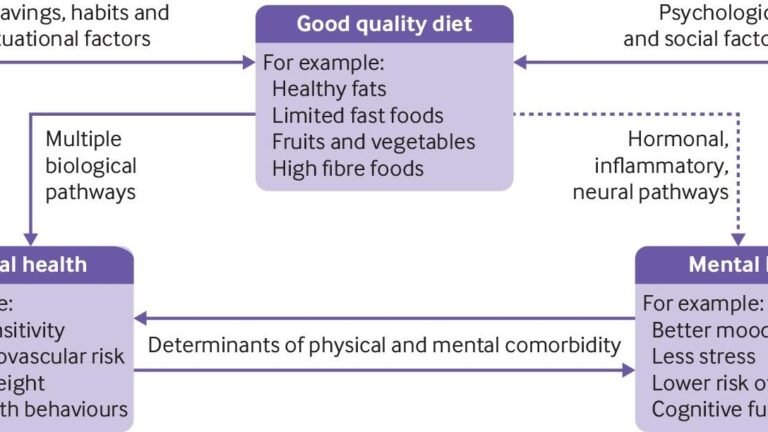There is growing awareness of the relationship between diet and mental health. The foods we consume can have a huge impact on our mental health, influencing our mood, anxiety levels, and even our risk of certain mental health disorders. A balanced diet rich in essential nutrients can support brain health and improve overall mental health.
The role of nutrition in mental health
Our brains, like other organs, require a continuous supply of essential nutrients to function optimally. Certain nutrients, such as carbohydrates, omega-3 fatty acids, protein, vitamins, and minerals, play important roles in brain health. For example, omega-3 fatty acids found in fatty fish and flaxseed are essential for brain function and development. It can also help reduce symptoms of depression and anxiety.
The importance of a balanced diet
A balanced diet is important not only for physical health, but also for mental health. Maintain a healthy weight, boost your immune system, and support brain function. Certain diets, such as the MIND diet, are designed to support brain health and reduce the risk of neurodegenerative diseases. A combination of the Mediterranean and DASH diets, the MIND diet focuses on brain-boosting foods like berries, leafy greens, fish, and nuts while minimizing unhealthy choices. Following a diet like this will improve your brain health, boost your memory, and increase your overall happiness.
Personalized nutrition and lifestyle changes
While it is important to consume a balanced diet, it is equally important to understand that nutrition is a very personal aspect. Personalized nutrition, which takes into account a person’s unique genetic makeup, lifestyle, and health goals, is more effective in improving mental health. Incorporating lifestyle changes such as regular exercise, stress management, and good sleep hygiene can also contribute to improving your mental health.
Scientific research: diet and mental health
A study investigating the association between Lifeline Diet Score (LLDS), depression, and quality of life in Iranian adolescent girls found an inverse association between LLDS and risk of depression. Girls in the top quartile of LLDS were significantly less likely to report depressive symptoms and poor quality of life. Similarly, other studies have shown that modern diets that promote inflammation, oxidative stress, and insulin resistance can negatively impact brain health and lead to mental health problems. However, if you restructure your diet based on the right information, you can see noticeable changes in your mental health within days or weeks.
conclusion
In conclusion, the impact of diet on mental health is significant and cannot be ignored. Whether it’s incorporating certain brain-boosting foods into your diet, following a specific meal plan like the MIND diet, or making lifestyle changes, each step can contribute to improving your mental health. By prioritizing your nutritional health, you can take a big step toward improving your mental health.


